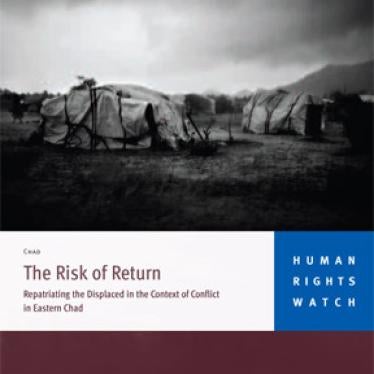Nearly two hundred thousand local people fled their homes when armed militias began to devastate eastern Chad in late 2005. Now, as conditions improve, some are trying to return home. Many find their land has been seized. Others are forced to join one of the paramilitary groups that still roam the countryside. Some face death. "Many of those people who attacked us are still there," one of the returnees said. "We see them. Sometimes we're in the fields and we hear gunshots. It's not safe."
"The Risk of Return: Repatriating the Displaced in the Context of Conflict in Eastern Chad," a new report from Human Rights Watch, documents the dangerous conditions returnees encounter. Based on hundreds of interviews in the region conducted over two years, it also outlines the complex political and ethnic currents that have turned eastern Chad - along with the Darfur region of neighboring Sudan - into a crisis zone.
Upheaval in Chad has displaced an estimated 180,000 people. Crowded into camps for internally displaced persons (IDPs) and concerned about their property, about 27,000 of these have ventured home in 2008. The UN peacekeeping operation in eastern Chad, known as MINURCAT, has designated return of a "critical mass" of the displaced to their home villages as one criterion for measuring the success of the mission. However, the Human Rights Watch report says, the government's army, police and gendarmes are rarely encountered anywhere in the east except for large, well-defended towns.
Dangerous conditions greatly limit humanitarian groups' access to outlying areas. But armed groups, ranging from Chadian rebel factions to loosely organized criminal gangs, operate freely. Many IDPs told Human Rights Watch that gunmen had seized their property and threatened to kill them if they did not go back to the camps. For example, an Arab rebel militia seized control of a Chadian border town from September to December 2008 and used death threats to extort money from civilians, including 600 IDPs. A witness recalled, "They came and said, ‘Now the government is us.'"
In The Risk of Return, Human Rights Watch calls on the government of Chad to improve security in rural areas where many of the displaced are returning. At the same time, the report says, the United Nations should make sure that food aid for displaced persons living in camps continues so that they are not compelled to cultivate crops in unsafe areas.
The report adds that many of the factors underlying conflict in eastern Chad, including rights of access and tenure to land and water, remain unresolved. While these are long-term and complex issues, the report says, the many reported incidents of violence and intimidation against returnees indicate that processes and mechanisms to address competing claims to land and water are essential to prevent violent confrontations as well as the disenfranchisement of particularly vulnerable groups, such as female-headed households.
"The Chadian government, with support from the UN, needs to strengthen the weak police presence in eastern Chad, especially in areas where people are now going back," said Georgette Gagnon, Africa director at Human Rights Watch. "Internally displaced Chadians have the same rights as any other citizens, and that includes protection from the bandits and paramilitary groups that rule the rural areas in eastern Chad."
Fact File
Widespread militia attacks in eastern Chad that began in late 2005 left hundreds of civilians dead and forced at least 180,000 into IDP camps.
An estimated 27,000 IDPs returned to their villages in eastern Chad in 2008.
Clashes in eastern Chad in May 2009 prompted three UN agencies and 11 NGOs to withdraw non-essential staff, hindering relief efforts for hundreds of thousands of civilians.
Out of 326 villages surveyed in the southeastern area of Dar Sila in 2008 by an Italian NGO, only 18 had functioning primary schools .
Main Recommendations
To the Government of Chad:
- Re-occupy all garrisons in Dar Sila and renew regular patrols to ensure the protection of civilians.
- Continue assistance to IDPs who choose to integrate into displacement sites.
- Distribute arable land to IDPs who wish to cultivate crops near their displacement sites, and ensure that local populations are consulted in all land distribution efforts and that their rights are preserved.
- Investigate and prosecute those responsible for violations of international humanitarian law or human rights law.
To MINURCAT:
- Monitor and report on security conditions in Dar Sila and other insecure areas and identify where further assessment is needed to evaluate risks to IDPs who may return to their homes.
- Conduct human rights monitoring of all government initiatives to return or relocate IDPs.
- Assess the appropriateness of establishing safe corridors for IDPs temporarily returning to their homes during agricultural seasons-and, if appropriate, provide them.
To the United Nations Security Council:
- Mandate MINURCAT to support the Chadian government in the investigation and prosecution of violations of international humanitarian law or human rights law, and request that MINURCAT and the Chadian government cooperate in the apprehension of alleged perpetrators of serious human rights violations in Dar Sila.
- To the UN Office for the Coordination of Humanitarian Aid:
- Ensure that food assistance continues to displaced persons whose home villages are situated in unsafe areas.







